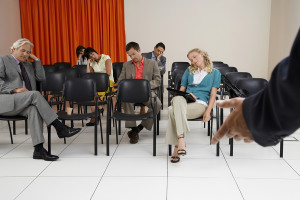 I am dreading this Wednesday morning. And it’s not because it’s March, I teach Seniors, and I have a few challenging classes. It’s because Wednesday morning begins a day of professional development.
I am dreading this Wednesday morning. And it’s not because it’s March, I teach Seniors, and I have a few challenging classes. It’s because Wednesday morning begins a day of professional development.
Now don’t get me wrong, I enjoy sleeping in a little bit and wearing jeans instead of khakis for a day just like any other male teacher, but too often I end a day of professional development ruing the missed opportunities and simply glad to get the heck out of there.
And that’s a shame, because I like my colleagues and I think they’re good at what they do. I look forward to the opportunity to sit across from them at a table and discuss potential new books, classroom management, or how to bring guest speakers into the building. It’s just that too often this isn’t what happens.
Too often the PD falls flat on its face, which is what we’ve come to expect as educators. The problem isn’t the time that’s set aside from instruction, the problem is that we don’t use that time as best we could.
We spend too much time on state-mandated material. We spend too much time sitting and only look and listening as someone from outside the district reads from a Powerpoint for over an hour. We’re not asked to reflect; we’re not asked to think of solutions ourselves.
In short, we’re trapped in a similar situation as our students may find in our classrooms. And guess what? We don’t like it either!
These are general observations of course, and I’ve experienced both teeth-grindingly tedious and downright enlightening and energizing PD at my new district. However, the latter just doesn’t happen enough.
So here’s one idea for an hour-long exercise to address one of an educator’s most common areas of concern: classroom management.
- Teachers walk in, they get 3 minutes to write lists of “Five common classroom management incidents that can be difficult to navigate.
- Teacher-presenter puts a list of resources (websites that they’ve found helpful themselves) on the projector screen.
- Move into groups of 4.
- Share lists; choose 2 – 3 that are most common/ difficult.
- Using the resources (websites/ smart phones/ professional experience) develop a list of phrases that a teacher can use in that specific incident, and develop a list of general guidelines for the educator.
- Share-out from groups.
- Teacher-presenter encourages teachers to think of “take-aways” or to set a goal for themselves based on this development; teacher-presenter compiles the lists and makes it available to the entire faculty + staff.
There’s nothing terribly fancy about this approach. We’re not doing role-plays and we’re not creating a curriculum “road map” using state standards.
We’re simply asked to see each other as experts.
The best professional development that I’ve experienced has always harnessed the knowledge and experience that’s already in the room, while also injecting a bit of new outside knowledge and asking us to rethink the way we do things in school.
Of course there are teacher-led conferences and informal meet-ups where this takes place, but I would argue that this is usually outside of the designated district-wide PD day. It’s the exception to the rule.
We can do better. And the good news is that this is already being done.
Groups like the Teacher Action Group of Philadelphia are doing this right now with their Inquiry to Action Groups. So it’s not a matter of re-inventing the wheel, it’s simply a matter of spreading the word that PD doesn’t have to be torturous.
Because no teacher should have to dread a day set aside to both reflect on the work and refresh the mind.
